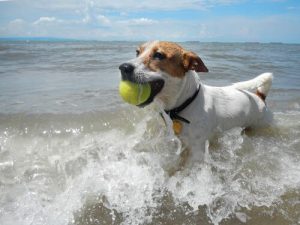Is Sea Water Good for Your Dog?


Written and verified by the lawyer Francisco María García
Sea water and its effect on dogs, is a subject that we often talk about. Dog lovers do have doubts about this each summer. Cases involving emergency trips to the vet after a visit to the beach are relatively common.
Also, since the end of the 19th century, there has been research into the health benefits of sea water. These studies have been carried out just as much on animals (cats and dogs) as on humans. The aim is to analyze treatments where the controlled ingestion of sea water is highly beneficial.
Sea Water Treatments
Whether you buy it commercially from pet shops, or get it straight from the sea, sea water treatments are very popular. It is proven to be effective for treating conditions such as anorexia, gastrointestinal disorders, renal problems, blood or respiratory disorders, cancer, tumours, allergies, and many more.
In fact, it has so many positive effects, that some vets recommend including a small amount in your pet’s regular diet.

Specialists who support this claim, believe that the key is in the sea water properties. It is very rich in nutrients and includes all elements of the periodic table. Furthermore, its general composition turns out to be very similar to the blood of vertebrate animals.
How to Use Sea Water for Your Dog
As with any animal treatment, it is important to consult your vet first. If your trusted vet does not support this treatment, then you can always seek a second opinion. But under no circumstances should you act on your own or medicate pets yourself.
There are a number of brands of bottled sea water on the market. Some are hypertonic (undiluted, or pure) and some are isotonic (diluted in fresh water). There are also some which are designed to be used as condiments.
Should Your Pet Drink Sea Water?
Drinking sea water is perfectly fine, as long as you bear the following things in mind:
- Make sure you go somewhere where you can be certain there is no waste water or human waste in the water.
- There is no need to swim out to sea. As long as the water is clean, you can collect it from the shore, but try to make sure it does not contain any sand.
- Ideally, leave it to rest in a glass bottle in a cool place for one week.
- Filtering it, as if it were a coffee, is also a valid method.
You should mix one glass of sea water with three glasses of fresh water. So that your animal begins to drink it themselves, place it just next to its normal water. Your dog will try a little bit more each time, until he is routinely drinking from both bowls of water.
How Sea Water Affects Your Dog’s Skin
The benefits of sea water for dogs have not just been proven to be internal. Sea water has been successfully used to treat skin conditions, wounds, and for healing and strengthening the skin.
Thanks to its antiseptic and healing properties, it restores damaged tissues caused by injuries or burns. Its anti-bacterial and anti-microbial powers also prevent infections from developing in skin lesions.
Sea water is very useful for alleviated rashes caused by atopic and seborrheic dermatitis, scabies, psoriasis, or dandruff. Furthermore, by reducing the rash, this stops your pet from scratching themselves compulsively and doing more damage.
Summer Poisoning
Excessive ingestion of sea water is not the only cause of hypernatremia (high levels of salt in the blood). At home, dogs can be exposed to things such as, table salt or clay.

To reduce the risks during your beach visits, keep an eye on your dog. Make sure they do not try to quench their thirst with sea water. Instead, always carry a bottle of fresh water with you.
Dogs love to swim and getting them out of the water can be quite difficult. It can be almost as difficult as with children! However, you should keep swimming controlled. If your dog is particularly hyperactive, one option is to play with them for as long as possible on the sand so as to tire them out.
Sea water and its effect on dogs, is a subject that we often talk about. Dog lovers do have doubts about this each summer. Cases involving emergency trips to the vet after a visit to the beach are relatively common.
Also, since the end of the 19th century, there has been research into the health benefits of sea water. These studies have been carried out just as much on animals (cats and dogs) as on humans. The aim is to analyze treatments where the controlled ingestion of sea water is highly beneficial.
Sea Water Treatments
Whether you buy it commercially from pet shops, or get it straight from the sea, sea water treatments are very popular. It is proven to be effective for treating conditions such as anorexia, gastrointestinal disorders, renal problems, blood or respiratory disorders, cancer, tumours, allergies, and many more.
In fact, it has so many positive effects, that some vets recommend including a small amount in your pet’s regular diet.

Specialists who support this claim, believe that the key is in the sea water properties. It is very rich in nutrients and includes all elements of the periodic table. Furthermore, its general composition turns out to be very similar to the blood of vertebrate animals.
How to Use Sea Water for Your Dog
As with any animal treatment, it is important to consult your vet first. If your trusted vet does not support this treatment, then you can always seek a second opinion. But under no circumstances should you act on your own or medicate pets yourself.
There are a number of brands of bottled sea water on the market. Some are hypertonic (undiluted, or pure) and some are isotonic (diluted in fresh water). There are also some which are designed to be used as condiments.
Should Your Pet Drink Sea Water?
Drinking sea water is perfectly fine, as long as you bear the following things in mind:
- Make sure you go somewhere where you can be certain there is no waste water or human waste in the water.
- There is no need to swim out to sea. As long as the water is clean, you can collect it from the shore, but try to make sure it does not contain any sand.
- Ideally, leave it to rest in a glass bottle in a cool place for one week.
- Filtering it, as if it were a coffee, is also a valid method.
You should mix one glass of sea water with three glasses of fresh water. So that your animal begins to drink it themselves, place it just next to its normal water. Your dog will try a little bit more each time, until he is routinely drinking from both bowls of water.
How Sea Water Affects Your Dog’s Skin
The benefits of sea water for dogs have not just been proven to be internal. Sea water has been successfully used to treat skin conditions, wounds, and for healing and strengthening the skin.
Thanks to its antiseptic and healing properties, it restores damaged tissues caused by injuries or burns. Its anti-bacterial and anti-microbial powers also prevent infections from developing in skin lesions.
Sea water is very useful for alleviated rashes caused by atopic and seborrheic dermatitis, scabies, psoriasis, or dandruff. Furthermore, by reducing the rash, this stops your pet from scratching themselves compulsively and doing more damage.
Summer Poisoning
Excessive ingestion of sea water is not the only cause of hypernatremia (high levels of salt in the blood). At home, dogs can be exposed to things such as, table salt or clay.

To reduce the risks during your beach visits, keep an eye on your dog. Make sure they do not try to quench their thirst with sea water. Instead, always carry a bottle of fresh water with you.
Dogs love to swim and getting them out of the water can be quite difficult. It can be almost as difficult as with children! However, you should keep swimming controlled. If your dog is particularly hyperactive, one option is to play with them for as long as possible on the sand so as to tire them out.
This text is provided for informational purposes only and does not replace consultation with a professional. If in doubt, consult your specialist.








